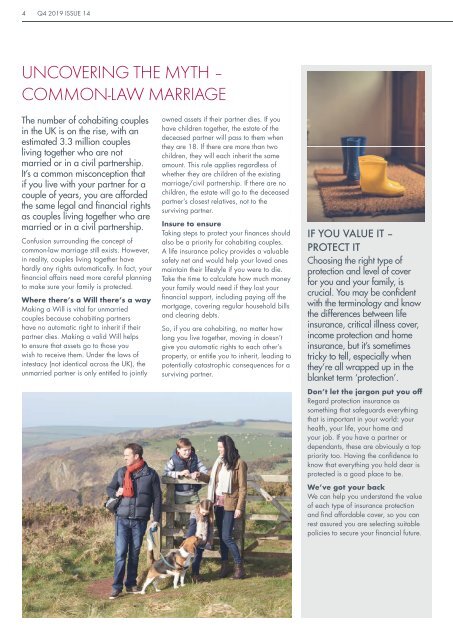Rockstone - Essentially Mortgages
Create successful ePaper yourself
Turn your PDF publications into a flip-book with our unique Google optimized e-Paper software.
4 Q4 2019 ISSUE 14<br />
UNCOVERING THE MYTH –<br />
COMMON-LAW MARRIAGE<br />
The number of cohabiting couples<br />
in the UK is on the rise, with an<br />
estimated 3.3 million couples<br />
living together who are not<br />
married or in a civil partnership.<br />
It’s a common misconception that<br />
if you live with your partner for a<br />
couple of years, you are afforded<br />
the same legal and financial rights<br />
as couples living together who are<br />
married or in a civil partnership.<br />
Confusion surrounding the concept of<br />
common-law marriage still exists. However,<br />
in reality, couples living together have<br />
hardly any rights automatically. In fact, your<br />
financial affairs need more careful planning<br />
to make sure your family is protected.<br />
Where there’s a Will there’s a way<br />
Making a Will is vital for unmarried<br />
couples because cohabiting partners<br />
have no automatic right to inherit if their<br />
partner dies. Making a valid Will helps<br />
to ensure that assets go to those you<br />
wish to receive them. Under the laws of<br />
intestacy (not identical across the UK), the<br />
unmarried partner is only entitled to jointly<br />
owned assets if their partner dies. If you<br />
have children together, the estate of the<br />
deceased partner will pass to them when<br />
they are 18. If there are more than two<br />
children, they will each inherit the same<br />
amount. This rule applies regardless of<br />
whether they are children of the existing<br />
marriage/civil partnership. If there are no<br />
children, the estate will go to the deceased<br />
partner’s closest relatives, not to the<br />
surviving partner.<br />
Insure to ensure<br />
Taking steps to protect your finances should<br />
also be a priority for cohabiting couples.<br />
A life insurance policy provides a valuable<br />
safety net and would help your loved ones<br />
maintain their lifestyle if you were to die.<br />
Take the time to calculate how much money<br />
your family would need if they lost your<br />
financial support, including paying off the<br />
mortgage, covering regular household bills<br />
and clearing debts.<br />
So, if you are cohabiting, no matter how<br />
long you live together, moving in doesn’t<br />
give you automatic rights to each other’s<br />
property, or entitle you to inherit, leading to<br />
potentially catastrophic consequences for a<br />
surviving partner.<br />
IF YOU VALUE IT –<br />
PROTECT IT<br />
Choosing the right type of<br />
protection and level of cover<br />
for you and your family, is<br />
crucial. You may be confident<br />
with the terminology and know<br />
the differences between life<br />
insurance, critical illness cover,<br />
income protection and home<br />
insurance, but it’s sometimes<br />
tricky to tell, especially when<br />
they’re all wrapped up in the<br />
blanket term ‘protection’.<br />
Don’t let the jargon put you off<br />
Regard protection insurance as<br />
something that safeguards everything<br />
that is important in your world: your<br />
health, your life, your home and<br />
your job. If you have a partner or<br />
dependants, these are obviously a top<br />
priority too. Having the confidence to<br />
know that everything you hold dear is<br />
protected is a good place to be.<br />
We’ve got your back<br />
We can help you understand the value<br />
of each type of insurance protection<br />
and find affordable cover, so you can<br />
rest assured you are selecting suitable<br />
policies to secure your financial future.


















